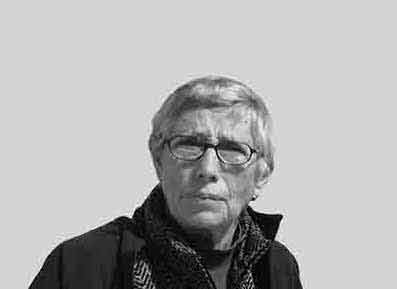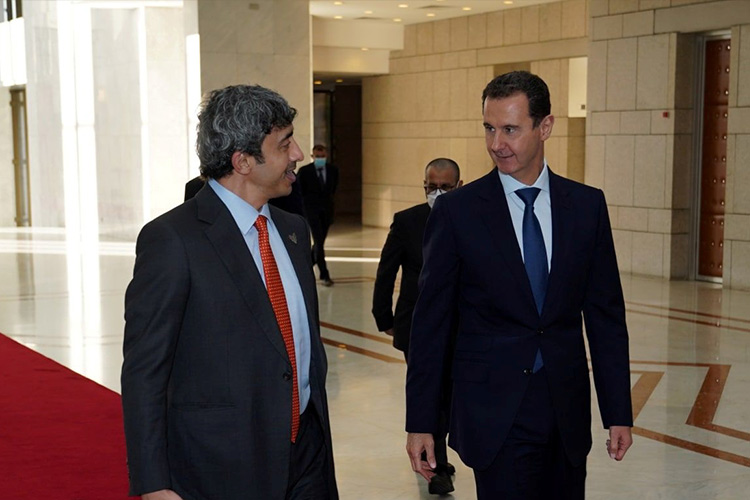Bolstering bilateral relations

Michael Jansen
The author, a well-respected observer of Middle East affairs, has three books on the Arab-Israeli conflict.

Foreign Minister Sheikh Abdullah bin Zayed Al Nahyan (left) with President Bashar Assad.
Following this encounter, UAE firms signed an agreement for the construction of a solar power plant in the suburbs of Damascus. This is a crucial project as the war has destroyed or damaged portions of the country’s electricity networks, causing long power cuts which have been exacerbated by fuel shortages due to US and European sanctions and the shortage of foreign currency to buy imported fuel.
Diplomatic relations between Syria and the UAE resumed when the Emirates reopened its Damascus embassy in late 2018. In March 2019, bin Zayed declared that the Emirates intended “to ensure that Syria returns to the Arab region” and called for an end to Syria’s suspension from Arab League membership. In September 2019, The Gulf Today met Emirati businessmen who attended the Damascus International Fair where the UAE was represented by an elegant exhibit. Oman also had a well designed display.
Last month, Assad held a telephone conversation with Jordan’s King Abdullah who is also promoting reconciliation with Syria and has opened the kingdom’s border with that country to travellers and trade. This was the first direct contact between the two leaders since 2011.
Jordanian Foreign Minister and Deputy Prime Minister Ayman Safadi followed up this telephone contact by arguing that the West must reassess its policy toward Syria as its policy of opposing the Assad government and isolating Syria have failed.
Safadi called for a political solution for the Syrian crisis and said that the kingdom is working with partners to achieve this end. He pointed out that Jordan has been heavily affected by the Syrian conflict as it hosts 1.3 million Syrian refugees, suffers from an end to trade with Syria, and faces the threat of terrorism and drug smuggling across its border with Syria.
Lebanon, which hosts 1.2 million Syrians, also favours the regional restoration of relations with Damascus. It has agreed to facilitate the provision of power and fuel by Jordan and Egypt through Syria’s electricity network and pipeline to bankrupt Lebanon. The US, which is against Arab reconciliation with Syria, has nevertheless agreed to grant a waiver from sanctions on this effort, a life-saver for beleaguered Lebanon. Syria is also expected to benefit both politically and materially from this project.
Cairo, which briefly closed its embassy in Damascus in 2013, has long promoted reconciliation and sees the Egypt-Jordan-Syria energy deal as a means to achieve multilateral cooperation and restore relations despite the stubborn US stand which stems from Damascus’ longstanding support for the Palestinian cause and ties to Tehran, Washington’s main regional antagonist.
Algerian Foreign Minister Ramtane Lamamra has also called for Syria to return to the Arab League, rejected external interference in Syrian domestic affairs and expressed the view that Damascus should be invited to the Arab summit in Algiers next March.
As another ally of Iran, Iraq has never closed its embassy in Damascus and abstained on the Arab League vote to suspend Syria’s membership. Oman has maintained its embassy in the Syrian capital with the aim of becoming a neutral mediator between the Syrian government and its detractors.
Lebanon and Jordan, in particular, have been negatively impacted by the Syrian war and the ostracism and the imposition of Western sanctions on Damascus. Lebanon was the gateway to the Levant. Western goods flowed through Lebanese ports and transited Lebanon and Syria to reach Jordan, Iraq and the Gulf while Lebanese and Syrian manufactured items and farm produce also followed these routes. Students from the Levant and the wider region flocked to Lebanese universities forming close relationships across borders.
Syria was the hub for trade, transit, and tourism for all three states. Today, Syria is an isolated and economically squeezed island. Its traditional trading partners are prohibited from dealing with the government, businesses, and individuals by the US Caesar law which punishes those who interact with Damascus. Jordan provided an economic hinterland and opportunities for investment and development.
Divided by colonial France and Britain into separate countries following World War I and the collapse of the Ottoman empire, Lebanon, Syria, Jordan and, to a lesser extent Iraq, formerly formed an inter-dependent socio-economic unit. Populations are related across-their borders by family, clan and tribal ties and intermarriages. Commercial connections were previously strong and profitable.
Gulf and Saudi citizens who formerly spent summers in Lebanon’s mountains and Syrian resorts and bought homes in Lebanon and Syria these countries stabilised and economically viable once again.
UAE and Jordanian moves are especially significant at a time the Biden administration has focused on China and the East rather than this region. While Washington is against the rehabilitation of Syria, this is essential if the Eastern Arab world is to regain coherence and restore Arab ranks.
They were breached when in 2003 the US invaded and occupied Iraq, formerly the hard core of this region and, ignorantly, installed a pro-Iranian government in Baghdad. This led to the rise of al-Qaeda, Daesh, and other radical groups in Iraq and Syria and the seizure of northern Syria and more than one-third of Iraq by Daesh. Although Daesh has been largely contained, it remains a threat to the region while pro-Iran militias have undermined Iraqi sovereignty and alienated Iraqis, exacerbating the unstable situation in that country and weakening the region’s former solid core.
Photo: AP







